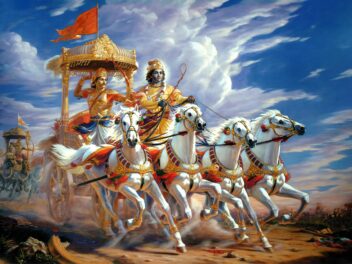Sri Suktam is a well-known hymn that is chanted as part of Hindu religious ceremonies at home and temples. It is also one of the Pancha Suktas (five suktas).
Sri Suktam (English)
Om hira̍ṇyavarṇā̱ṃ hari̍ṇīṃ su̱varṇa̍raja̱tasra̍jām |
ca̱ndrāṃ hi̱raṇma̍yīṃ la̱kṣmīṃ jāta̍vedo ma̱ āva̍ha || 1 ||
tāṃ ma̱ āva̍ha̱ jāta̍vedo la̱kṣmīmana̍pagā̱minī̎m |
yasyā̱ṃ hira̍ṇyaṃ vi̱ndeya̱ṃ gāmaśva̱ṃ puru̍ṣāna̱ham || 2 ||
a̱śva̱pū̱rvāṃ ra̍thama̱dhyāṃ ha̱stinā̍dapra̱bodhi̍nīm |
śriya̍ṃ de̱vīmupa̍hvaye̱ śrīrmā̍de̱vīrju̍ṣatām || 3 ||
kā̱ṃ so̎smi̱tāṃ hira̍ṇyaprā̱kārā̍mā̱rdrāṃ jvala̍ntīṃ tṛ̱ptāṃ ta̱rpaya̍ntīm |
pa̱dme̱ sthi̱tāṃ pa̱dmava̍rṇā̱ṃ tāmi̱hopa̍hvaye̱ śriyam || 4 ||
ca̱ndrāṃ pra̍bhā̱sāṃ ya̱śasā̱ jvala̍ntī̱ṃ śriya̍ṃ lo̱ke de̱vaju̍ṣṭāmudā̱rām |
tāṃ pa̱dminī̍mī̱ṃ śara̍ṇama̱haṃ prapa̍dye’la̱kṣmīrme̍ naśyatā̱ṃ tvāṃ vṛ̍ṇe || 5 ||
ā̱di̱tyava̍rṇe̱ tapa̱so’dhi̍jā̱to vana̱spati̱stava̍ vṛ̱kṣo’tha bi̱lvaḥ |
tasya̱ phalā̍ni̱ tapa̱sā nu̍dantu mā̱yānta̍rā̱yāśca̍ bā̱hyā a̍la̱kṣmīḥ || 6 ||
upai̍tu̱ māṃ de̍vasa̱khaḥ kī̱rtiśca̱ maṇi̍nā sa̱ha |
prā̱du̱rbhū̱to’smi̍ rāṣṭre̱’smin kī̱rtimṛ̍ddhiṃ da̱dātu̍ me || 7 ||
kṣutpi̍pā̱sāma̍lāṃ jye̱ṣṭhāma̍la̱kṣmīṃ nā̍śayā̱myaham |
abhū̍ti̱masa̍mṛddhi̱ṃ ca sarvā̱ṃ nirṇu̍da me̱ gṛhā̍t || 8 ||
ga̱ndha̱dvā̱rāṃ du̍rādha̱rṣā̱ṃ ni̱tyapu̍ṣṭāṃ karī̱ṣiṇī̎m |
ī̱śvarī̍gṃ sarva̍bhūtā̱nā̱ṃ tāmi̱hopa̍hvaye̱ śriyam || 9 ||
mana̍sa̱: kāma̱mākū̍tiṃ vā̱caḥ sa̱tyama̍śīmahi |
pa̱śū̱nāṃ rū̱pamanna̍sya̱ mayi̱ śrīḥ śra̍yatā̱ṃ yaśa̍: || 10 ||
ka̱rdame̍na pra̍jābhū̱tā̱ ma̱yi̱ sambha̍va ka̱rdama |
śriya̍ṃ vā̱saya̍ me ku̱le mā̱tara̍ṃ padma̱māli̍nīm || 11 ||
āpa̍: sṛ̱jantu̍ sni̱gdhā̱ni̱ ci̱klī̱ta va̍sa me̱ gṛhe |
ni ca̍ de̱vīṃ mā̱tara̱ṃ śriya̍ṃ vā̱saya̍ me ku̱le || 12 ||
ā̱rdrāṃ pu̱ṣkari̍ṇīṃ pu̱ṣṭi̱ṃ pi̱ṅga̱lāṃ pa̍dmamā̱linīm|
ca̱ndrāṃ hi̱raṇma̍yīṃ la̱kṣmīṃ jāta̍vedo ma̱ āva̍ha || 13 ||
ā̱rdrāṃ ya̱: kari̍ṇīṃ ya̱ṣṭi̱ṃ su̱va̱rṇāṃ he̍mamā̱linīm |
sū̱ryāṃ hi̱raṇma̍yīṃ la̱kṣmī̱ṃ jāta̍vedo ma̱ āvaha || 14 ||
tāṃ ma̱ āva̍ha̱ jāta̍vedo la̱kṣmīmana̍pagā̱minī̎m |
yasyā̱ṃ hi̍raṇya̱ṃ prabhū̍ta̱ṃ gāvo̍ dā̱syo’śvā̎nvi̱ndeya̱ṃ puru̍ṣāna̱ham || 15 ||
oṃ ma̱hā̱de̱vyai ca̍ vi̱dmahe̍ viṣṇupa̱tnī ca̍ dhīmahi |
tanno̍ lakṣmīḥ praco̱dayā̎t ||
oṃ śānti̱: śānti̱: śānti̍: ||
Sanskrit: श्रीसूक्त (ऋग्वेद)
ॐ ॥ हिरण्यवर्णां हरिणीं सुवर्णरजतस्रजाम् ।
चन्द्रां हिरण्मयीं लक्ष्मीं जातवेदो म आवह ॥ १॥
तां म आवह जातवेदो लक्ष्मीमनपगामिनीम् ।
यस्यां हिरण्यं विन्देयं गामश्वं पुरुषानहम् ॥ २॥
अश्वपूर्वां रथमध्यां हस्तिनादप्रबोधिनीम् ।
श्रियं देवीमुपह्वये श्रीर्मादेवीर्जुषताम् ॥ ३॥
कां सोस्मितां हिरण्यप्राकारामार्द्रां ज्वलन्तीं तृप्तां तर्पयन्तीम् ।
पद्मे स्थितां पद्मवर्णां तामिहोपह्वये श्रियम् ॥ ४॥
चन्द्रां प्रभासां यशसा ज्वलन्तीं श्रियं लोके देवजुष्टामुदाराम् ।
तां पद्मिनीमीं शरणमहं प्रपद्येऽलक्ष्मीर्मे नश्यतां त्वां वृणे ॥ ५॥
आदित्यवर्णे तपसोऽधिजातो वनस्पतिस्तव वृक्षोऽथ बिल्वः ।
तस्य फलानि तपसा नुदन्तु मायान्तरायाश्च बाह्या अलक्ष्मीः ॥ ६॥
उपैतु मां देवसखः कीर्तिश्च मणिना सह ।
प्रादुर्भूतोऽस्मि राष्ट्रेऽस्मिन् कीर्तिमृद्धिं ददातु मे ॥ ७॥
क्षुत्पिपासामलां ज्येष्ठामलक्ष्मीं नाशयाम्यहम् ।
अभूतिमसमृद्धिं च सर्वां निर्णुद मे गृहात् ॥ ८॥
गंधद्वारां दुराधर्षां नित्यपुष्टां करीषिणीम् ।
ईश्वरीꣳ सर्वभूतानां तामिहोपह्वये श्रियम् ॥ ९॥
मनसः काममाकूतिं वाचः सत्यमशीमहि ।
पशूनां रूपमन्नस्य मयि श्रीः श्रयतां यशः ॥ १०॥
कर्दमेन प्रजाभूता मयि सम्भव कर्दम ।
श्रियं वासय मे कुले मातरं पद्ममालिनीम् ॥ ११॥
आपः सृजन्तु स्निग्धानि चिक्लीत वस मे गृहे ।
नि च देवीं मातरं श्रियं वासय मे कुले ॥ १२॥
आर्द्रां पुष्करिणीं पुष्टिं पिङ्गलां पद्ममालिनीम् ।
चन्द्रां हिरण्मयीं लक्ष्मीं जातवेदो म आवह ॥ १३॥
आर्द्रां यः करिणीं यष्टिं सुवर्णां हेममालिनीम् ।
सूर्यां हिरण्मयीं लक्ष्मीं जातवेदो म आवह ॥ १४॥
तां म आवह जातवेदो लक्ष्मीमनपगामिनीम् ।
यस्यां हिरण्यं प्रभूतं गावो दास्योऽश्वान्विन्देयं पुरुषानहम् ॥ १५॥
यः शुचिः प्रयतो भूत्वा जुहुयादाज्य मन्वहम् ।
श्रियः पञ्चदशर्चं च श्रीकामः सततं जपेत् ॥ १६॥
Commentary
Sri Suktam is one of the earliest hymns comprising multiple verses that invokes Lakshmi as the goddess of wealth and prosperity. Here the deity (goddess Lakshmi) represents the Supreme Consciousness, the one divine intelligence. Sri Suktam is a khila sukta, i.e., a supplementary sukta (sukta is a set of mantras) to the Rig Veda. It appears between the fifth and sixth mandalas (mandala refers to canto or chapter) of the Bashkala shakha of the Rig Veda. Rig Veda is available in two shakhas or recensions – Bashkala and Shakala.
The Sri Suktam has 15 mantras or riks (The mantras of the Rig Veda are called riks). Sri Suktam (together with its commentaries) is also available in sources other than the Rig Veda, primarily in texts related to the worship of goddess Lakshmi. Many of these have several additional verses, sometimes going up to 22, thus making a total of up to 37 verses. The most common additions made to the 15 mantras are a phala shruti (recompense for chanting the hymn) and the Lakshmi gayatri mantra. The additional verses are actually supplementary to Sri Suktam, which itself is a supplementary to the Rig Veda. A few of these additional verses are drawn from the puranas.
Each mantra in the Rig Veda is customarily associated with a rishi (sage or seer), a deva (god) and a chandas (a poetical meter). Sri Suktam is associated with four rishis – Ananda, Chiklita, Kardama and Srida. Further, Sri Suktam is connected with two gods – Jataveda (i.e., Agni, the god of fire) and Lakshmi (i.e., Sri). Sri Suktam is in fact primarily addressed to Jataveda, as it appeals to him repeatedly to “invoke (or bring) Lakshmi for me.” Most of the 15 mantras in Sri Suktam are in anushtup chandas.
Sri Suktam is also rich in its poetic content and provides a vivid and awe-inspiring description of the goddess – as golden-hued, resplendent like the moon and sun, bedecked in gold and silver necklaces, having a smiling face, seated on a lotus, and so on. This helps to visualize the goddess and seek her propitiation with a focused mind. Her arrival is described as being heralded by horses, chariots and the trumpeting of elephants. The hymn prays the goddess for wealth in the form of gold, cows, horses, people/servants, and also for fame and success. It also prays for the expulsion of hunger, thirst, poverty and misfortune (all these represented by Jyeshtha, the elder sister of Lakshmi) from one’s house.
Meaning
Om hira̍ṇyavarṇā̱ṃ hari̍ṇīṃ su̱varṇa̍raja̱tasra̍jām |
ca̱ndrāṃ hi̱raṇma̍yīṃ la̱kṣmīṃ jāta̍vedo ma̱ āva̍ha || 1 ||
Oh, Jataveda! Bring her for me – that Lakshmi who is golden hued, beautiful as a doe, who is adorned in gold and silver garlands, who is resplendent as the moon, and who is the golden one.
This mantra (and much of Sri Suktam) is addressed to Jataveda, i.e., Agni, the god of fire. Agni is the messenger through whom one conveys prayers and offerings to the gods. Jataveda literally means he for whom the vedas were born. ‘Harini’ means female deer, but could also be interpreted as feminine of Harina, i.e., Vishnu.
tāṃ ma̱ āva̍ha̱ jāta̍vedo la̱kṣmīmana̍pagā̱minī̎m |
yasyā̱ṃ hira̍ṇyaṃ vi̱ndeya̱ṃ gāmaśva̱ṃ puru̍ṣāna̱ham || 2 ||
Bring her for me, Oh, Jataveda! – that Lakshmi who does not forsake; through whom I can obtain gold, cows, horses and people.
This mantra uses the term ‘anapagamini’ – who does not flow away like water (i.e., who does not forsake). The term ‘purusha’ used here could imply people in the form of friends, servants and progeny. Here ‘purusha’ does not mean godhead (as in Purusha Sukta).
a̱śva̱pū̱rvāṃ ra̍thama̱dhyāṃ ha̱stinā̍dapra̱bodhi̍nīm |
śriya̍ṃ de̱vīmupa̍hvaye̱ śrīrmā̍de̱vīrju̍ṣatām || 3 ||
Her arrival is heralded by horses in the front, chariots in the middle, followed by the awakening sound of trumpeting elephants. I pray the goddess of wealth to come near me. Let the divine mother be pleased.
Here, it is presumed that Agni has begun bringing Lakshmi to the worshiper, and this mantra now directly addresses Lakshmi. The word ‘ma’ could be interpreted as ‘mother’ or as ‘to me’.
kā̱ṃ so̎smi̱tāṃ hira̍ṇyaprā̱kārā̍mā̱rdrāṃ jvala̍ntīṃ tṛ̱ptāṃ ta̱rpaya̍ntīm |
pa̱dme̱ sthi̱tāṃ pa̱dmava̍rṇā̱ṃ tāmi̱hopa̍hvaye̱ śriyam || 4 ||
I call upon that Shri (i.e., Lakshmi), who is Brahma herself, who has a glowing smile, is of golden form (or is engulfed in gold), is kind and effulgent; who is contented and satisfies others, who is seated on a lotus and is of the color of a lotus.
The term ‘ka’ is used as a name of Brahma. Referring to Lakshmi as Brahma suggests that she is beyond perception through words and thoughts. ‘Ardram’ could mean kind (i.e., dayardram) and also ‘wet’ as she emerges from the ocean of milk. Likewise, the word ‘jwalanthim’ used in this mantra could be translated effulgent/shining or as ‘blazing’, and hence illumining our minds. Lakshmi is devoid of desires herself, but meets the desires of her devotees.
ca̱ndrāṃ pra̍bhā̱sāṃ ya̱śasā̱ jvala̍ntī̱ṃ śriya̍ṃ lo̱ke de̱vaju̍ṣṭāmudā̱rām |
tāṃ pa̱dminī̍mī̱ṃ śara̍ṇama̱haṃ prapa̍dye’la̱kṣmīrme̍ naśyatā̱ṃ tvāṃ vṛ̍ṇe || 5 ||
I take refuge in her, who is beautiful as the moon, self-luminescent, who is glowing with glory, who is the affluence of this world, who is pleased by the gods, who is generous, who is the protector of the world. I beseech you, so that my misfortune is destroyed.
‘Padmanemim’ means ring or felly of the wheel of this world (‘padma’ = world; ‘nemi’ = felly of a wheel), i.e., one who encircles and protects this world. ‘Padmanemim’ is also interpreted as she who is seated in a lotus pond. The word ‘Jyeshtha’ used here refers to the elder sister of Lakshmi, representing poverty and misfortune.
ā̱di̱tyava̍rṇe̱ tapa̱so’dhi̍jā̱to vana̱spati̱stava̍ vṛ̱kṣo’tha bi̱lvaḥ |
tasya̱ phalā̍ni̱ tapa̱sā nu̍dantu mā̱yānta̍rā̱yāśca̍ bā̱hyā a̍la̱kṣmīḥ || 6 ||
Oh, the one who is of the color of the (rising) sun! Through your penance emerged the bilva – a forest tree. Through your worship (by me), let the fruits of the bilva tree dispel both my internal and external poverty.
Bilva is a fruit-bearing tree sacred to Hindus. There are different stories in Hindu mythology about the association of Lakshmi’s penance with the bilva tree. Internal poverty refers to poverty of the mind such as ego, ignorance, sinful thoughts, etc. External poverty refers to material poverty.
upai̍tu̱ māṃ de̍vasa̱khaḥ kī̱rtiśca̱ maṇi̍nā sa̱ha |
prā̱du̱rbhū̱to’smi̍ rāṣṭre̱’smin kī̱rtimṛ̍ddhiṃ da̱dātu̍ me || 7 ||
I have been born in this land (i.e., in this material world). Let Kubera come near me, along with Keerthi and Mani. May they give me fame and abundance.
This mantra is addressed to Kubera, the god-form who is the caretaker of wealth, who is subordinate to Lakshmi. Kubera is referred to here as ‘devasakha’ (friend or companion of devas). The word ‘keerthi’ means fame, which is an intangible form of wealth. Keerthi is also a (female) member of Lakshmi’s entourage. ‘Mani’ means a bead, by wearing which, one’s sins and poverty are destroyed. It also refers to Manibhadra – a yaksha, who is the treasurer of Kubera.
kṣutpi̍pā̱sāma̍lāṃ jye̱ṣṭhāma̍la̱kṣmīṃ nā̍śayā̱myaham |
abhū̍ti̱masa̍mṛddhi̱ṃ ca sarvā̱ṃ nirṇu̍da me̱ gṛhā̍t || 8 ||
I shall get rid of hunger, thirst and all forms of misfortune (through your grace). May you banish non-well-being and lack of prosperity in their entirety from my house.
This mantra is once again addressed to Lakshmi. It uses the terms ‘Jyeshtha’ and ‘Alakshmi’ to represent non-well being and lack of prosperity.
ga̱ndha̱dvā̱rāṃ du̍rādha̱rṣā̱ṃ ni̱tyapu̍ṣṭāṃ karī̱ṣiṇī̎m |
ī̱śvarī̍gṃ sarva̍bhūtā̱nā̱ṃ tāmi̱hopa̍hvaye̱ śriyam || 9 ||
I invite that Shri towards me, who is the gateway to (many distinctive) odors, who is difficult to be made to lose her patience, who is ever-nourishing, has an abundance of cow-dung (i.e., rich in cattle, etc.), and is the ruler of all beings.
Here, Lakshmi is addressed in the form of mother earth. In Hindu culture, the earth (prithvi) is also described as gandhavati (i.e., having smells and odours of various kinds). The earth is extremely tolerant of all the use and abuse she is subjected to by living creatures, and is considered as being extremely patient and forgiving.
mana̍sa̱: kāma̱mākū̍tiṃ vā̱caḥ sa̱tyama̍śīmahi |
pa̱śū̱nāṃ rū̱pamanna̍sya̱ mayi̱ śrīḥ śra̍yatā̱ṃ yaśa̍: || 10 ||
Let me enjoy the desires of the mind, my intentions and the truth of my speech. The form of animals and food, wealth and glory – may all these reside in me.
Animals would include cattle, horses, elephants, etc. The word ‘rupam’ is used here to mean form or appearance; and this adjective applies to both ‘pashunam’ (of animals) and ‘annasya’ (of food).
ka̱rdame̍na pra̍jābhū̱tā̱ ma̱yi̱ sambha̍va ka̱rdama |
śriya̍ṃ vā̱saya̍ me ku̱le mā̱tara̍ṃ padma̱māli̍nīm || 11 ||
Come to me, Oh, Kardama! for whom (i.e., for Kardama), Lakshmi became a mother/daughter. She who is adorned with a garland of lotuses, make that mother (of yours) – Shri, reside in my household.
This mantra is addressed to Kardama. Kardama is a rishi (sage) and also a prajapati (a ruler of this world). In different puranas, Kardama is said to be a manasa putra (spiritual son) of Lakshmi and is also said to have taken Lakshmi to be his daughter. The term ‘prajabhuta’ used in this mantra can mean both – one who became a progenitor and also one who became a progeny.
āpa̍: sṛ̱jantu̍ sni̱gdhā̱ni̱ ci̱klī̱ta va̍sa me̱ gṛhe |
ni ca̍ de̱vīṃ mā̱tara̱ṃ śriya̍ṃ vā̱saya̍ me ku̱le || 12 ||
May the waters create affection/bonding. Oh Chiklita! reside in my house. And get that goddess, mother Shri, to reside in my household.
This mantra is addressed to Chiklita, who is another manasa putra of Lakshmi and also a rishi. Water is the principal constituent in all living beings and bonds life together. Water (including rain) is extremely important for creation and sustenance of life, and is therefore an important determinant of wealth and prosperity. Lakshmi is said to go wherever Chiklita goes, and hence the appeal to him to reside in one’s house.
ā̱rdrāṃ pu̱ṣkari̍ṇīṃ pu̱ṣṭi̱ṃ pi̱ṅga̱lāṃ pa̍dmamā̱linīm|
ca̱ndrāṃ hi̱raṇma̍yīṃ la̱kṣmīṃ jāta̍vedo ma̱ āva̍ha || 13 ||
Oh, Jataveda! Bring that Lakshmi towards me – she who is merciful, who is seated in a lotus pond, who bestows nourishment, who is fire-like in color, who wears a garland of lotuses, who is beautiful as the moon and who is the golden one.
The last three verses are once again addressed to Jataveda, i.e., Agni, the god of fire. ‘Pushkarini’ actually means a pond of lotuses but is here interpreted as one who is seated in a lotus pond. Pushkarini can also mean a female elephant.
ā̱rdrāṃ ya̱: kari̍ṇīṃ ya̱ṣṭi̱ṃ su̱va̱rṇāṃ he̍mamā̱linīm |
sū̱ryāṃ hi̱raṇma̍yīṃ la̱kṣmī̱ṃ jāta̍vedo ma̱ āvaha || 14 ||
Oh, Jataveda! She who is merciful, who controls the world as its staff or support, who is of golden color, who wears a garland of gold, who is luminescent as the sun, who is the golden one – bring that Lakshmi for me.
tāṃ ma̱ āva̍ha̱ jāta̍vedo la̱kṣmīmana̍pagā̱minī̎m |
yasyā̱ṃ hi̍raṇya̱ṃ prabhū̍ta̱ṃ gāvo̍ dā̱syo’śvā̎nvi̱ndeya̱ṃ puru̍ṣāna̱ham || 15 ||
Oh, Jataveda! Bring that Lakshmi for me, who never forsakes, through whom I may obtain an abundance of gold, cows, servants, horses and people.
The final verse is the phala sruthi, states that he who is desirous of prosperity should incessantly recite this set of fifteen verses of Shri, being cleansed and purified.



